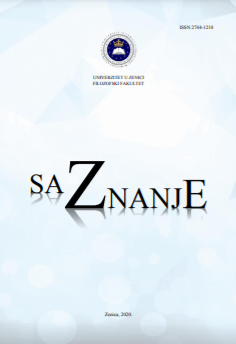DIACHRONE KOMPOSITIONELLE INTERTEXTUALITÄT IN DEN MEDIENTEXTEN ZUR MIGRATIONSPOLITIK
DIACHRONIC COMPOSITIONAL INTERTEXTUALITY IN THE MEDIA TEXTS ON MIGRATION POLICY
Author(s): Amela ĆurkovićSubject(s): Media studies, Philology, Asylum, Refugees, Migration as Policy-fields
Published by: Filozofski fakultet, Univerzitet u Zenici
Keywords: Intertextuality; Intertextual References; Mediatexts; Migration Policy; Context; Headlines; Quotes; Pre- and Posttexts; Intratextuality;
Summary/Abstract: Migration policy is a topical global issue which has been often addressed and discussed in various media (newspapers, radio, television, electronic media) and through different types of texts (news, commentary, interview, feature story, report, blog etc). There is an innumerable amount of texts on this topic which cannot be viewed independently, but are embedded in a wider context and references are made from one text to the other. This ability that one text emerges with reference to another text is called intertextuality in the relevant literature, which is examined in this article. Furthermore, the analysis includes the diachronic compositional approach to intertextuality, whereby an older text or a text passage from a pretext is embedded in a new situational context by creating a new meaning there. In this way, new texts are created continuously, by which the text environment and communication situation interact with one another. By using the analytical instruments of intertextuality, this article will show how the texts receive a new context when they are understood by the recipients. In the socalled intertextual chain of the selected media texts on migration policy, the focus is on the evaluation of persons, facts and events that are addressed in various texts, which is a central aspect in the recontextualisation process of the individaul texts. This research article shows that reviews are often linked by the text chain i.e. the text history can be passed on without this being recognisable in the current text at the end of the chain.
Journal: saZnanje
- Issue Year: 2/2020
- Issue No: 2
- Page Range: 147-154
- Page Count: 8
- Language: German

